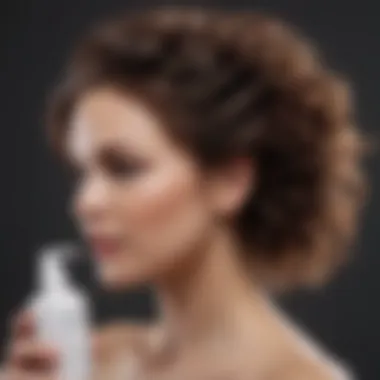Top Hairfall Shampoos for Women: A Comprehensive Guide


Intro
Hair loss is a significant concern for many women across various ages. It can arise from multiple factors, including hormonal changes, stress, and certain medical conditions. Understanding the cause is the first step towards addressing the issue. This article aims to explore effective shampoos designed specifically for women dealing with hair fall. We will examine key ingredients to look for, review popular products, and provide insights into how these options cater to different hair types. The ultimate goal is to help women make informed decisions and regain confidence in their hair care routines.
Causes of Hair Fall
Before diving into product recommendations, it’s crucial to understand the common reasons behind hair loss. Factors such as genetics, hormonal changes, and dietary deficiencies play a significant role. Each woman’s hair care routine can also impact results, from the use of heat styling tools to the frequency of washing.
- Hormonal Changes: Fluctuations due to pregnancy, menopause, or thyroid issues can lead to increased hair fall.
- Stress: High-stress levels can cause temporary hair shedding, known as telogen effluvium.
- Nutritional Deficiencies: Lack of essential nutrients, such as biotin and iron, may weaken hair and result in loss.
Key Ingredients to Look For
When selecting a shampoo to combat hair fall, certain ingredients can significantly enhance effectiveness. Recognizing these components ensures that you choose products that nourish the scalp and strengthen hair.
- Biotin: Known for enhancing hair growth and thickness.
- Keratin: A protein that repairs and strengthens damaged hair strands.
- Caffeine: Stimulates hair follicles and may encourage growth.
- Saw Palmetto: Often used to combat hormonal hair loss.
When combined, these ingredients can offer a robust solution to hair fall issues.
Recommended Products
Several shampoos in the market are specifically formulated to combat hair loss in women. Each product caters to different hair types and concerns, making it essential to select one that aligns with your needs.
- Nizoral A-D Anti-Dandruff Shampoo: This shampoo addresses dandruff while promoting a healthier scalp, reducing hair fall caused by irritation.
- Pura D'or Original Gold Label Shampoo: Uses natural ingredients known for preventing hair loss and increasing thickness. Ideal for all hair types.
- OGX Biotin & Collagen Shampoo: Enriches hair with biotin and collagen, improving volume and strength.
- Alpecin Caffeine Shampoo: Targets hair roots, enhances growth, and is particularly effective for those experiencing hormonal loss.
- Love Beauty and Planet Coconut Oil and Ylang Ylang Shampoo: Designed for dry hair, it nourishes while strengthening, offering a more luxurious feel.
Culmination
The journey to managing hair fall involves understanding its causes and selecting appropriate products. By focusing on effective shampoos with the right ingredients, women can take proactive steps towards healthier hair. Remember, consistency is key. Embrace a tailored hair care routine and consult with professionals when necessary. Making informed choices empowers women to tackle hair loss with confidence.
Intro to Hairfall in Women
Hair loss is a significant concern that affects many women across various age groups. Understanding this topic is vital because it directly impacts a woman's self-esteem and mental well-being. Hairfall can have various causes, and it is essential to address these issues comprehensively.
The experience of hair loss can create feelings of vulnerability and self-consciousness. Women often identify their hair as a component of their identity. Thus, discussing hairfall is not only about addressing a physical condition but also about the emotional challenges it presents.
Moreover, knowledge is power. By understanding the reasons behind hair loss, women can make informed decisions regarding their hair care routines. This article seeks to explore the multifaceted causes of hair loss and emphasize the importance of choosing the right products.
As women navigate various life stages, hormonal fluctuations, dietary changes, and stress levels can lead to noticeable changes in hair health. These factors highlight the need to understand the complexities of hairfall. A well-informed choice regarding hair products can lead to better outcomes, both aesthetically and health-wise.
Ultimately, this part of the article serves as a foundation for discussing effective solutions, including shampoos that may help minimize hair loss. By addressing hairfall comprehensively, we can dismantle the stigma and provide support for women facing this issue.
Understanding Hair Loss
Understanding hair loss is crucial when addressing the issue of hairfall in women. Women are often affected by various forms of hair loss, and recognizing the type they are experiencing can significantly impact treatment options. Different types of hair loss stem from various causes, and each requires a unique approach. Moreover, by understanding hair loss, women can make better choices regarding the products they use, particularly shampoos designed to reduce hairfall.
Types of Hair Loss
Alopecia Areata
Alopecia Areata is an autoimmune condition where the body's immune system mistakenly attacks hair follicles, leading to sudden hair loss. This type is characterized by patchy bald spots with otherwise healthy hair around them. It is a often seen as sporadic, affecting those unpredictably. This article discusses it as it can occur in women of any age. It poses challenges because of its unpredictable nature, making it crucial for women to seek proper advice and possible treatments. Understanding Alopecia Areata can guide selections in hair care products that focus on soothing the scalp and promoting growth.
Telogen Effluvium
Telogen Effluvium is often temporary and usually occurs after a stressful event or significant change in health. It's characterized by widespread thinning rather than specific bald spots, as in Alopecia Areata. This condition results when hair follicles enter the resting phase prematurely. It is beneficial to know about Telogen Effluvium as it may resolve on its own once the stressor is identified and addressed. However, recognizing it can help women choose shampoos that target scalp health and encourage healthy hair growth through nourishing ingredients.


Traction Alopecia
Traction Alopecia results from continuous tension and stress on the hair, typically caused by certain hairstyles that pull on the roots. It is mainly caused by chronic hairstyles like tight ponytails or braids. This type of hair loss is relevant since many women wear styles that can contribute to it. It is essential to understand how Traction Alopecia works because, while it may be reversible, awareness can lead to more responsible hair styling choices. Choosing shampoos that address this issue to strengthen the hair is advisable.
Common Causes of Hair Loss in Women
Hormonal Changes
Hormonal changes play a significant role in hair loss for women. Factors such as pregnancy, menopause, and hormonal disorders can lead to increased hair fall. Understanding this helps women recognize when hair loss can be a side effect of hormonal change. Acknowledging these changes is crucial for selecting hair products, as some may help to balance scalp health and stimulate growth through specific ingredients.
Diet and Nutrition
Diet and nutrition are critical in maintaining hair health. Deficiencies in vitamins and minerals can lead to weaker hair. A diet lacking in nutrients like iron or biotin can contribute to hair loss. Highlighting its importance helps women take a closer look at their nutrition. Opting for shampoos that also emphasize nourishing ingredients may complement a healthy diet and address hair fall more effectively.
Stress and Mental Health
Stress and mental health issues are significant contributors to hair loss among women. High stress levels can trigger conditions like Telogen Effluvium. This link shows the importance of mental well-being. Understanding this relationship can lead women to seek holistic solutions that include shampoos with stress-relief properties or calming ingredients. By managing stress, they can minimize hair loss and improve overall hair health.
The Role of Shampoo in Hair Care
In the context of hair care, shampoo plays a crucial role, particularly for women experiencing hair fall. A shampoo's primary function is to cleanse the hair and scalp of dirt, oil, and product buildup. However, the right shampoo goes beyond mere cleansing. It can nourish the hair, support healthy growth, and maintain scalp health. Thus, understanding the role of shampoo allows women to make more informed decisions about their hair care routines.
Choosing the correct shampoo is fundamental for maintaining healthy hair. For women dealing with hair loss, shampoos designed to address this specific issue can make a significant difference. They often contain active ingredients that aid hair strength, promote growth, and reduce breakage. Ultimately, the right shampoo should cater to the individual’s hair type and address any specific concerns related to hair fall.
Importance of Choosing the Right Shampoo
Selecting the appropriate shampoo is vital in a woman’s hair care regimen. It's not just about cleaning; the right shampoo can influence hair structure and overall health. Look for shampoos that do not contain harsh chemicals, which can damage the hair over time, contributing to falling strands. Instead, opt for products that offer nourishment and hydration.
There are various formulations available that target specific hair types and concerns, such as:
- Sulfate-free shampoos: These are gentler on the scalp and less likely to strip the hair of its natural oils.
- Moisturizing shampoos: Ideal for dry hair, these are formulated to hydrate and soften hair, reducing brittleness.
- Strengthening shampoos: These often include proteins that help fortify hair strands, making them less prone to damage and breakage.
Ultimately, the ideal shampoo will differ from person to person. Therefore, women must assess their hair type, scalp condition, and any specific issues they may face in order to find a shampoo that suits their unique needs.
How Shampoo Affects Hair Health
The impact of shampoo on hair health is profound. Each wash with the right shampoo can cleanse impurities without causing excess dryness. By using a product that is well-suited to their needs, women can promote a healthy scalp environment. A healthy scalp significantly contributes to the strength and growth of hair.
Using the right shampoo contributes to healthier hair through several mechanisms:
- Cleansing the scalp: A clean scalp means fewer irritants which can lead to inflammation or hair fall.
- Balancing oil levels: Properly formulated shampoos can help maintain the scalp's natural oil levels, preventing it from becoming too oily or too dry.
- Promoting circulation: Massaging the scalp during washing can encourage blood flow to hair follicles, which is essential for growth.
"In the quest for healthy hair, the right shampoo is not merely an accessory. It’s a foundational component of effective hair care."
Key Ingredients to Look for in Hairfall Shampoos
Selecting the right shampoo can prove crucial for women experiencing hairfall. Key ingredients help determine the overall effectiveness of the product. Understanding these elements can empower consumers to make better choices. Therefore, identifying which components are effective against hair loss is of paramount importance. This section delves into several critical ingredients that should be considered when choosing hairfall shampoos. Each ingredient brings unique benefits and properties, contributing to healthier hair.
Biotin and Its Benefits
Biotin, also known as vitamin B7, plays a significant role in hair health. It helps in the production of keratin, a primary protein that makes up hair strands. Biotin is effective in improving hair strength and promoting growth. Women often find it beneficial because it supports overall wellness. Including biotin as an ingredient in hairfall shampoos can encourage thicker and healthier hair. Its natural properties help in addressing the biotin deficiency that many individuals face. Therefore, look for shampoos with biotin if you are dealing with excessive hair loss.
DHT Blockers
Dihydrotestosterone, or DHT, is a hormone known to play a central role in hair loss. Shampoos that contain DHT blockers can effectively reduce hair fall. Ingredients such as pumpkin seed oil and green tea extract actively combat DHT, making them popular in many formulations. These natural components work by inhibiting the hormone's production, which subsequently minimizes hair thinning.


Pumpkin Seed Oil
Pumpkin seed oil emerges as a strong DHT blocker. It contains phytosterols, which are compounds known for their ability to inhibit the action of DHT. These characteristics make pumpkin seed oil a preferred choice among women experiencing hair loss. The oil is also rich in essential fatty acids, providing nourishment to the scalp. Its use in hairfall shampoos contributes to a healthier environment for hair growth. While beneficial, it’s not suitable for every hair type; some people may find it too heavy.
Green Tea Extract
Green tea extract is another effective DHT blocker. It is rich in antioxidants like epigallocatechin gallate (EGCG), which not only combats DHT but also stimulates hair follicles. This extract offers both anti-inflammatory and anti-aging benefits. It helps to reduce scalp irritation while supporting hair growth. Green tea extract is a popular option in hairfall shampoos due to its multiple advantages. However, it may not provide immediate results, requiring consistent use for noticeable effects.
Natural Oils and Extracts
Natural oils and extracts serve various purposes in hairfall shampoos. From providing moisture to enhancing overall scalp health, these ingredients are essential for anyone concerned about hair loss.
Coconut Oil
Coconut oil is well-known for its moisturizing properties. It penetrates hair follicles effectively, providing deep hydration. This oil helps prevent hair breakage, which can be detrimental during hairfall. Its antimicrobial properties promote a healthy scalp environment. Many women consider coconut oil a valuable addition to hairfall shampoos, as it nourishes and strengthens hair. Its lightweight nature makes it suitable for various hair types. On the downside, excessive use can lead to greasy hair.
Jojoba Oil
Jojoba oil is often hailed as a wonderful carrier oil. It closely resembles the natural oils produced by our skin, making it an excellent moisturizer. Its composition helps control sebum production on the scalp, thus preventing clogged pores. Jojoba oil's ability to nourish hair and promote growth makes it valuable in hairfall shampoos. Additionally, it soothes any irritation present on the scalp. However, some may find it less effective in combating severe dryness.
Argan Oil
Argan oil stands out for its high concentration of vitamin E and fatty acids. These elements work synergistically to enhance hair health. It helps in repairing damaged hair and adding shine, thus contributing to a more vibrant appearance. Argan oil not only nourishes but also strengthens hair strands. This makes it a popular ingredient in many premium hairfall shampoos. Despite its numerous benefits, it may not suit all hair types, particularly those prone to oiliness.
In summary, selecting a shampoo enriched with these key ingredients can help manage hairfall. Biotin, DHT blockers, and natural oils play significant roles in ensuring hair health. Therefore, a careful examination of product labels is necessary for any woman looking to alleviate hair loss effectively.
Potentially Harmful Ingredients to Avoid
When selecting a shampoo to combat hair fall, awareness of what is inside the product is crucial. Some ingredients can actually exacerbate hair loss or negatively affect scalp health. Understanding these harmful components empowers women to make informed choices. This section highlights key ingredients to avoid, focusing on their potential impacts and the necessity for caution.
Sulphates and Their Impact
Sulphates, particularly sodium lauryl sulphate (SLS) and sodium laureth sulphate (SLES), are common components in many shampoos. They serve as cleansing agents, but they can also strip hair of natural oils. This can result in dryness and irritation of the scalp.
Women with sensitive scalps may find that shampoos containing sulphates lead to excessive itching or flaking. Over time, using such products may contribute to hair thinning as the hair becomes brittle. Opting for sulphate-free shampoos can help maintain moisture, reduce irritation, and support overall hair health.
Parabens and Their Controversies
Parabens are preservatives often found in personal care products, including shampoos. They serve a practical purpose by preventing the growth of harmful bacteria and mold. However, concerns about their safety have arisen, particularly regarding their potential link to hormonal disruption. Some research suggests a connection between parabens and breast cancer, although evidence remains inconclusive.
Despite ongoing debates, many women prefer to avoid parabens in their hair care products. The fear of disrupting hormonal balance has led to an increase in demand for paraben-free shampoos. Choosing alternatives not only aligns with a growing preference for natural ingredients but also ensures a more gentle approach for hair and scalp health.
Considering these aspects can guide women toward healthier, more suitable hair care options that contribute to better hair stability and growth.
Best Hairfall Shampoos for Women
The topic of hairfall shampoos for women is crucial for those seeking solutions to a common and distressing issue. Hair loss can stem from numerous factors, and selecting the right shampoo can play a significant role in managing the condition. Effective shampoos not only cleanse the scalp but also contain essential ingredients that promote hair health. By understanding the specific needs related to hair fall, women can make better choices that support their hair's growth and vitality.
Top Recommended Products
When searching for the best hairfall shampoos, it is essential to consider products that have been clinically tested and widely endorsed. Here are some top recommendations:
- Pura D'or Original Gold Label Anti-Hair Thinning Shampoo
This shampoo features a blend of natural extracts, including argan oil and biotin, aimed at strengthening hair and reducing thinning. It is sulfate-free, making it suitable for sensitive scalps. - Briogeo Blossom & Bloom Ginseng + Biotin Volumizing Shampoo
Enriched with ginseng and biotin, this shampoo aims to add volume while promoting hair growth. It is particularly notable for its clean ingredients and efficacy in stimulating the scalp. - Maple Holistics Argan Oil Shampoo
This shampoo utilizes the moisturizing benefits of argan oil and is designed to nourish dry hair while combating loss. Its gentle formula is good for daily use, promoting overall hair health.


Each of these shampoos contains beneficial ingredients that can address hair loss effectively while catering to individual preferences regarding formulation and scent.
Shampoos for Different Hair Types
Different hair types have unique needs when it comes to selecting a shampoo for hair fall. Understanding these differences helps in choosing the right products based on individual hair characteristics.
Oily Hair
Oily hair can face challenges like excess sebum production, which can lead to build-up on the scalp. Choosing a shampoo that tackles oiliness while not stripping the hair of essential moisture is crucial.
A key characteristic of shampoos suitable for oily hair is their ability to cleanse without over-drying. Products containing tea tree oil or salicylic acid are particularly beneficial, as they can help balance oil levels, aiding in keeping the scalp clean. However, care should be taken to avoid shampoos that are too harsh, as they may irritate the scalp.
Dry Hair
Shampoos designed for dry hair focus on hydration and moisture retention. Dry hair may be more prone to breakage, and therefore, selecting a nourishing shampoo is important. Shampoos containing natural oils such as jojoba or argan oil are popular choices, as they deeply condition hair fibers and help improve elasticity.
The unique feature of shampoos for dry hair is often their creamy and rich formulation, which helps soften and restore shine. However, it is necessary for users to ensure that these products don’t leave an oily residue as it may weigh down the hair.
Curly Hair
Curly hair has a distinct structure that often requires specialized care to maintain its health and definition. The right shampoo for curly hair should provide defined moisture while also enhancing curl pattern and bounce. Shampoos that contain hydrating agents like aloe vera or glycerin are excellent choices to support curl definition.
One of the advantages of curly hair shampoos is their blend of moisturizing and humectant properties. However, these shampoos sometimes contain heavier oils, which may not suit all hair types. Users with fine or thin hair should research formulations to avoid feeling weighed down.
Choosing the right shampoo based on individual hair type contributes significantly to overall hair health and aids in minimizing hair fall.
Application Tips for Effective Use of Shampoos
When addressing hair fall issues, the selection of an appropriate shampoo is only the first step. The method in which you apply and use hair products can significantly influence their effectiveness. Proper application ensures that the active ingredients penetrate the hair shaft and the scalp effectively, thereby maximizing potential benefits. This section details valuable tips that can help optimize the results of hairfall shampoos.
Proper Washing Techniques
Washing hair may seem straightforward, but suitable techniques can enhance the effectiveness of the shampoo. Here are some key considerations:
- Wet Your Hair Gradually: Begin by thoroughly wetting your hair with warm water. This helps to open the hair cuticles, allowing the shampoo to clean and nourish the hair more effectively.
- Use a Small Amount of Shampoo: It is typically best to use a dime-sized amount of shampoo. Applying too much can lead to buildup and may weigh down your hair.
- Lather Gently: Instead of vigorously scrubbing your scalp, apply the shampoo gently. Focus on your scalp and roots while massaging in a circular motion. This not only helps to cleanse but also promotes blood circulation to the scalp.
- Rinse Thoroughly: After allowing the shampoo to sit for a couple of minutes, be careful to rinse your hair thoroughly. Residual shampoo can lead to irritation and dryness, counteracting the benefits.
Frequency of Washing
The frequency of washing your hair is another crucial aspect. It can vary based on individual hair types and lifestyles. Here are some points to consider:
- Oily vs. Dry Hair: People with oily hair might benefit from washing it daily or every other day to reduce grease and buildup. On the other hand, those with dry or curly hair should wash it less frequently, perhaps every three to four days, to prevent stripping natural oils.
- Scalp Health: It’s essential to listen to your scalp. If it feels itchy or flaky, it may require more frequent washing. Conversely, if your scalp feels clean and healthy, extending the time between washes can also be beneficial.
- Lifestyle Factors: Consider your daily activities. If you exercise frequently or spend time in humid environments, you may need to wash your hair more often to keep it fresh.
The right combination of washing techniques and frequencies can significantly boost the effectiveness of any hairfall shampoo.
Incorporating these application tips can help you make informed choices, ultimately contributing to healthier and fuller hair.
The End: Making Informed Choices
In the journey of managing hair fall, the importance of making informed choices cannot be overstated. This article delves into various aspects of hair care tailored specifically for women, emphasizing the necessity of understanding the nuances of hair loss, the critical role of shampoo selection, and recognizing effective ingredients.
Picking the right shampoo is not merely about brand loyalty or marketing claims, but rather about aligning the product to one’s unique hair needs and conditions. The scope of ingredients, both beneficial and harmful, can have lasting effects on hair health. Thus, consumers should be equipped with knowledge about what to prioritize and avoid in their hair care products.
When considering the hairfall shampoos recommended, it is crucial to identify personal hair types and concerns. Different formulations cater to specific needs, whether it be oily, dry, or curly hair. This individualized approach ensures that the chosen product not only reduces hair fall but also enhances overall hair health.
Furthermore, awareness of harmful ingredients is vital. Ingredients like sulphates and parabens can exacerbate hair loss or cause additional scalp issues, underscoring the need for vigilance while reading labels. A conscious selection can directly contribute to healthier hair and scalp.
"Choosing wisely in hair care can yield results that contribute to long-term hair vitality."
Remember: Education and awareness are tools to combat hair fall effectively. Understanding both the root causes of hair loss and recognizing how specific shampoos can address these concerns is essential. It leads to making choices that resonate with personal hair care goals.
By considering the information provided in this guide, women can approach hair care not just with hope, but with a practical strategy designed to promote strength and resilience in their hair.







